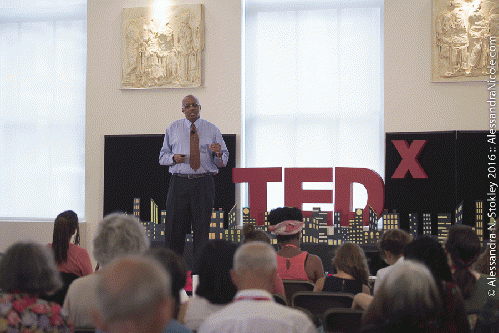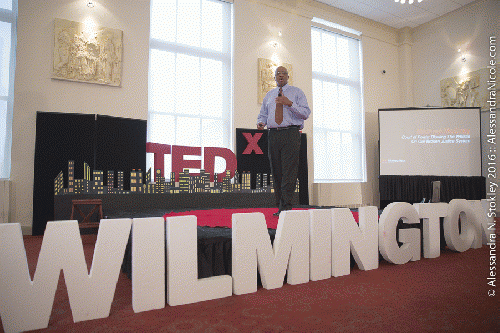| Back OpEd News | |||||||
|
Original Content at https://www.opednews.com/articles/5-Things-I-Learned-From-Bl-by-Michael-McCray-Acorn-8-whistleblower-Summit_Communication-Lecturing-Public-Speaking_Marcel-Reid_Michael-Mccray-180606-680.html (Note: You can view every article as one long page if you sign up as an Advocate Member, or higher). |
|||||||
June 6, 2018
5 Things I Learned From Blowing My TEDx Talk
By Michael McCray
Many people think giving a TEDx Talk is the chance of a lifetime. You can share your message and reach a billion people over a global platform. But what happens when you fcuk up on the biggest, grandest international stage--a performance that will be relived forever because the internet does not forget? Here are five things that I wish I knew before I gave my TEDx talk...
::::::::

Michael McCray on stage at the Historic Delaware Public Library
(Image by Alessandra Nicole) Details DMCA
Many people think giving a TEDx Talk is the chance of a lifetime. You can share your message and reach a billion people over a global platform. But what happens when you fcuk up on the biggest, grandest international stage--a performance that will be relived forever because the internet does not forget?
A good friend of mine described it like this: "Think back to how it felt when you tripped and fell in front of the Student Union. Now imagine you're not falling in front of a hundred students, but failing in front of a billion viewers."
My July 30 TEDx Wilmington talk on judicial reform constituted the absolute best, "worst" 15 minutes of my life. My presentation was so bad that I now want to do a TEDx Talk on "Blowing Your TEDx Talk." It was as painful to watch as it was to deliver.
I had planned to start by citing popular contemporary themes (Hands Up, Don't Shoot, Black Lives Matter, etc.), then mention the names of victims of police brutality in chronological order. I mentioned Michael Brown, and Sandra Bland but became flustered when I couldn't remember Trayvon Martin's name. That broke my rhythm, throwing me off stride, as I watched the digital timer counting down faster than any stopwatch I'd ever seen.
In one moment, I was transported back to my sixth grade piano recital solo when I forgot which notes to play next. Scared, sweating and shaking, that day I started over three times before finishing my piece. Decades later, and after being a lawyer and accomplished speaker in a more traditional format, I never expected to find myself back in that dark place.

Michael McCray on stage at the Historic Delaware Public Library
(Image by Alessandra Nicole) Details DMCA
Here's what I wish I knew before I gave my talk:
1: Give yourself six months' planning time.
To give a TED Talk most people prepare for six months, spending up to 50 hours crafting and practicing. I had six weeks to plan, organize and practice my talk while simultaneously planning a major convention event and coordinating the other speakers at the TED Talk. Be careful you don't overcommit too.
2: Recognize that a TED Talk is a different animal.
Unlike most speeches people normally give, Ted Talks revolve around inspirational stories paired with an actionable idea. You have only 15 minutes and there is no Teleprompter.
3: Make good use of slides
Compelling photos make great slides but make sure you have copyright permission for every image you use. You may want to use text-only slides in order to avoid permission delays and issues. Sometimes less is more; using fewer slides (or none) reduces the difficulty between coordinating your TED Talk and slide deck. Practice your talk with the slides with the "clicker" you will use for your TED Talk. Otherwise, you might accidentally click your slides in reverse order.
4: Don't look down
During my fiasco " err, talk, I focused on three friends who were sitting on the front row. You're not supposed to do that because it looks like you are looking down on video. However, talking directly to my friends was the only way I could calm down and finish my talk. What you want to do is to scan the audience near the rear of the auditorium, and also to look towards the cameras (probably three).
5: If necessary, improvise
With the lock running down, I knew I was not going to be able to give my full talk, so I decided to tell only the relevant parts of my story and then go straight into my big idea. I didn't complete my full story arch but I was able to articulate my idea: that the justice system is not accountable to ordinary Americans because judges are not accountable to ordinary Americans.
Happy ending
The entire experience was bittersweet for me because I was responsible for organizing a historic salon of whistleblower speakers, which gave eight advocates a global platform to share their messages. Five out of seven of us gave truly remarkable presentations, but my talk missed the mark--badly.
The other speakers included Stephen Kohn, who shared the untold story of the whistleblowers of 1777; Marcel Reid an ACORN whistleblowers and summit co-organizer--talked about whistle-blowing as an extension of hope, I discussed blowing the whistle on our broken courts, Ken Williams, a former Boston-area homicide detective, discussed how a whistleblower lawsuit could reform policing in America, Arthuretta Martin discussed blowing the whistle while Black and Tom Devine described whistle-blowing as a global phenomenon. We also debuted "The Panama Papers" the first TED video on whistleblowers and the International Consortium of Investigative Journalists, at the salon.

Ajit George and Whistleblower Summit speakers on stage at the Historic Delaware Public Library
(Image by Alessandra Nicole) Details DMCA
Ajit George, host of the TEDx Wilmington, and Michael McCray, organizer of the Whistleblower Summit for Civil & Human Rights--conclude the Historic TEDx Salon: Whistleblowers and the First Amendment with a Whistleblower Summit Group Picture.
These important TEDx Talks are available at: www.WhistleblowerSummit.com/tedx_salon_2016
At the end of the day, I had an amazing experience arranging, organizing and presenting the TEDx Wilmington talk. My TEDx Salon: Whistleblowers and the First Amendment was an unbridled success, even though I bombed my talk. I would not trade this experience for anything in the world.
I don't know if you get banned from TED if you bomb one talk. I hope one day I might get a second chance to deliver the important talk I intended to give. See My Rehearsal Talk at (https://youtu.be/PfC7N-ATAiI)
Authors Website: http://www.WhistleBlowerSummit.com
Authors Bio:
Michael McCray is a public interest advocate who combats racism and corruption in the government and other institutions which deprive individuals of their basic civil rights, human rights and constitutional liberties. McCray is co-chair of the International Association of Whistleblowers (IAW), and a National Board Member for Federally Employed Women Legal Education Fund (FEW/LEF). McCray is the Author of ACORN 8: RACE, POWER & POLITICS--Memoirs of an ACORN Whistleblower; and he also hosts "The Fifth Estate" on Pacifica Radio, the only show made by whistleblowers--about whistleblowers.